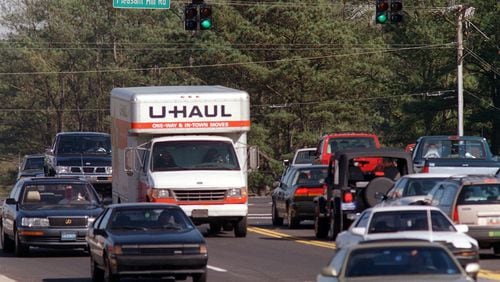Over the course of five days, Madhu Deshmukh lost four relatives in India to COVID-19.
First was her cousin, just 54 years old. Then an uncle in his early 90s. Her aunt was next, a 74-year-old woman who was like a sister to Deshmukh’s mother. And last, her husband’s grandfather.
A good friend is on a ventilator, fighting for his life, and Deshmukh said she’s scared each morning to look at her phone, wary of what news there might be.
“Every day, I open the WhatsApp not knowing; every night, I go to bed not knowing,” she said. “I find myself breaking down at the drop of a hat.”
The coronavirus pandemic, which has killed more than 3 million people globally, is now raging in India, where more than 2,000 people are dying each day. The crisis is so bad that people are being turned away from hospitals, where there are no beds and no oxygen.
That’s what happened to Deshmukh’s aunt, who collapsed outside her home after a futile attempt to seek medical care.
“These are the gut-wrenching stories you hear,” said Deshmukh, who lives in Sandy Springs and is the vice president for program, strategy and impact for CARE USA. “It’s been extremely difficult.”
More than 100,000 metro Atlanta residents are of Indian origin, a third of all Asian residents in the 10-county region. Indians represent the largest Asian group in metro Atlanta. Many local residents are immigrants, and have friends or family in India who have been affected by the pandemic. They are doing what they can to help.
CARE is working with state governments in India to set up COVID-19 care centers to help seriously ill people, while also addressing vaccine hesitancy and getting people vaccinated, according to information from the Atlanta-based global nonprofit. One center in Bihar State serves as a field hospital in Patliputra Indoor Stadium and the other as a COVID-19 wing at ESIC Medical College. Each has 100 beds.
CARE said the cost to run each center is about $150,000 a month and it expects the need to last for three months. The nonprofit is seeking donations to support the efforts.
Many are scrambling to provide aid. Emory University sophomore Tanvi Rudraraju is working with other members of the school’s Hindu Students Association on an online fundraising campaign through Mission Oxygen to pay for oxygen containers and cylinders for hospitals across India.
Rudraraju’s grandfather was recently hospitalized after a bout with COVID-19. He was released early because the hospital didn’t have enough beds to treat every patient.
“The pandemic is not over,” said Rudraraju, 19. “It really cannot be over until these really hard hit countries are helped.”
Georgia Tech associate professor Ankur Singh created some information he posted online to share with people in India to encourage them to get vaccinated and dispel misinformation about the vaccines.
I have prepared a response to most frequently asked questions from friends and family in #india about #COVID19 #vaccines. This may help. #CovidIndia pic.twitter.com/HcBIiLs2WN
— Ankur Singh (@Dr_ASingh) May 3, 2021
Others are doing what they can. Mitesh Patel, who lives in Alpharetta, has been raising money through BAPS Charities, focusing on oxygen. So has Jigar Patel, an emergency medicine physician at WellStar North Fulton who lives in Roswell. Both know people who were killed by the virus.
MAP International, an Atlanta nonprofit with a global distribution center in Brunswick, Ga., has 40 pallets of personal protection equipment, hospital gowns and other supplies ready to be airlifted to India, President and CEO Steve Stirling said.
The situation, he said, “is really bad. It’s worse than being reported.”
Two staffers are from India and during the Monday corporate time of prayer they have asked others in MAP to pray for their families.
“It’s very personal,” Stirling said. “... There are no hospital beds. There’s no oxygen. It’s far from over. In the United States we are so blessed, we have access to vaccines. It’s a dire need.”
The UPS Foundation, based in Sandy Springs, announced a $1 million in emergency funding, in-kind transportation and technical expertise to fight the surge in India. The logistics company is partnering with CARE and others to move supplies like oxygen concentrators and ventilators and to set up as many as seven temporary medical centers.
And Global Ministries and the United Methodist Committee on Relief is supporting the purchase of additional emergency equipment.
Dr. Nabile Safdar, a radiologist with Emory University and president of the board Islamic Medical Association of North America, said the organization is sending several shipments of medical supplies of as part of its #HelpIndiaBreathe initiative.
Followers of the Chicago-based organization’s Instagram page has grown from less than 1,000 to 42,000 since the campaign launched. This equipment, including oxygen concentrators, nasal cannulas and non-rebreather oxygen masks, will be repackaged and delivered to Delhi.
Shiv Aggarwal, who owns the Global Mall in Norcross and whose siblings are isolating in New Delhi, said donations to SEWA International and Ekal Vidyalaya make him feel as if he’s able to do something to help, when it feels like there’s little to be done from afar.
“If we can save even one life, we have done our job,” he said. “At the same time, we have to keep praying.”
At a recent gathering of 10 local friends, “each and everybody had somebody that died,” said Anoop Kapoor, president of the North Indian American Cultural Association. Kapoor, who lives in Alpharetta, estimated he paid the equivalent of more than $400 for an oxygen cylinder when his brother-in-law came down with COVID-19; before the pandemic, it shouldn’t have cost more than $20.
“It has been a nightmare,” Kapoor said. “For people who don’t have resources, it’s a very difficult time. It’s costing lives.”
Deshmukh said though she’s fully vaccinated, she can’t bring herself to gather with friends in her yard to talk about the stress of the pandemic. While work in the past had been a distraction, it’s now a reminder of everything that she can’t do, and the number of friends and family members who remain vulnerable.
“On the one hand, I feel blessed being in this country. We’ve come so far as we come back to normalcy,” she said. “It’s diametrically opposite in India. It’s really difficult to deal with both emotions.
“Relief, gratitude, a feeling of helplessness. ...It’s emotionally too much.”








